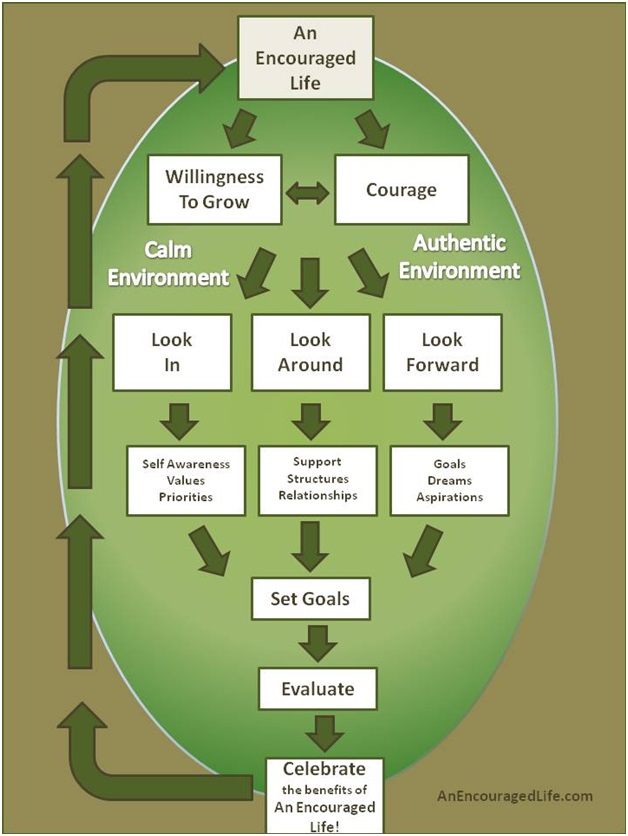A Coaching Model Created by Rachelle Triay
(Life Coach, UNITED STATES)
You will never do anything in this world without courage. It is the greatest quality of the mind next to honor. Aristotle
For a person to enter the coaching relationship, they must have:
When clients begin coaching, and throughout the process, they must have a commitment to living a more productive, purpose-filled life. They are making a commitment to grow. Growth always requires change. You cannot grow and stay the same. Change requires courage!
COURAGE → GROWTH → CHANGE
When coaching, I strive to provide a calm, authentic environment filled with encouragement where the client will find the courage to take action, learn and grow. Creating this space optimizes the client’s experience with and benefits from coaching.
The Courage To Look In
With coaching, the client enters a journey of Self-Discovery. Self-Awareness is the foundation of coaching. For a client to be set for success, goals must align with who the client is – their core values, priorities, beliefs.
Looking in can be a very scary part of the process for the client. They may have to come to terms with things such as past hurts and regrets and negative underlying beliefs. As a coach, I am committed to supporting the client when they choose to dig deeper and encouraging them along the way, knowing that the growth that will occur will be powerful.
The Courage To Look Around
Whatever goals a client brings to the coaching relationship, an important part of the coaching process is to assist the client in setting up support structures so they are more likely to achieve their goals. Examples of support structures might be an accountability partner for a bible study, a calendar to help with scheduling, or a pedometer to keep track of daily exercise.
It is also important to help the client identify any negative or hindering structures they may have in place and not even realize it. Examples include: bad habits that need to be broken, an unhealthy relationship that needs to be addressed, or unhealthy negative self-talk.
The Courage To Look Forward
Coaching is forward thinking. The client is encouraged to dream big.
- What are their aspirations?
- What have they always dreamed of doing?
- What has been put on the back burner?
Healthy people dream and aspire to grow. Sometimes clients have stopped dreaming, or are scared to dream because of fear of failure or fear of success. As a coach, I will help the client develop their dreams and identify any obstacles that may be in the way of their dreams!
Whatever you do, you need courage. Whatever course you decide upon, there is always someone to tell you that you are wrong. There are always difficulties arising that tempt you to believe your critics are right. To map out a course of action and follow it to an end requires some of the same courage that a soldier needs. Ralph Waldo Emerson
Set Goals
Whether the client is concentrating on Looking In, Looking Around , Looking Forward or any combination of the three, it is important for them to set goals for success. Goals should be written down and be SMART goals. For more info on creating SMART GOALS, click here:
As a coach, I will help the client define both long and short term goals and encourage them to work toward achieving them.
Success is not final, failure is not fatal: it is the courage to continue that counts. Winston Churchill
Evaluate
An important part of the coaching process is taking the time to evaluate progress toward the goals. This is also the time to decide if the goal is still something important to the client. Another key component of evaluating is to assist the client in identifying anything that may be stopping them or slowing them down on their way to achieving their goals.
Celebrate!
A vital aspect of the coaching relationship is to celebrate. As the client makes steps along the way, as their coach, I will take the time to acknowledge their progress and celebrate milestones with them on their journey to achieving their goals. This is an integral part of encouraging the client to continue their progress.
Repeat!
Finally, the coaching process is ongoing. As the client reaches goals, attains growth, etc., then they can choose to set new goals or choose growth in other areas, for a continuous ongoing coaching relationship/lifestyle.
